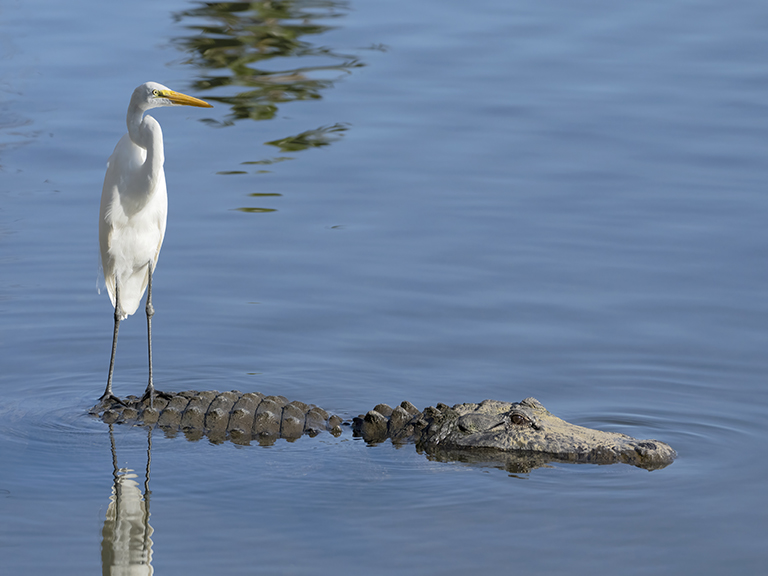- Parenting
- Safety
Tame your enthusiasm: Stay safe around Florida wildlife

In this article, you’ll find answers to questions like:
1. How to react to an animal?
2. Is it OK to feed wildlife?
3. What if baby animal is alone?
Florida wildlife is exciting - especially if you're new to the area! But keeping our distance and being respectful of nature helps protect us — as well as the animals. Here’s how we can do that.
1. HOW TO REACT TO AN ANIMAL?
Use common sense and take a moment to carefully think things through when you spot an animal in your yard or surrounding area, says Amy Kight, executive director of Busch Wildlife Sanctuary in Jupiter. The nonprofit organization treats sick, injured and orphaned wildlife.
“Stop and assess the situation before taking any action,” she says. “Never mess with, approach or try to catch a wild animal.”
The Busch Wildlife Sanctuary hotline, 561-599-0071, is monitored by trained staff 24 hours a day. Residents can reach out with any wildlife questions.
2. IS IT OK TO FEED WILDLIFE?
Most alligators avoid people, but they can startle easily because they sleep with their eyes closed, she says. A slumbering alligator may instinctively try to defend itself against the vibrations and waves from a pet swimming or a child walking close to the water’s edge.
“There are over a million alligators in Florida. They can submerge themselves for up to eight hours at a time, so always assume that in any body of fresh water, an alligator is present,” Kight says.
Although we share canals and other freshwater areas with otters, herons and egrets, they usually avoid people unless food is prevalent, such as a pond stocked with fish, Kight says. Likewise, bobcats, deer and opossums avoid humans unless food is left outside or they’re trying to protect their young.
Never feed wildlife; feeding encourages dependence on humans and ultimately can spread disease and sicken animals. Secure trash cans and keep them covered with tight lids to prevent attracting raccoons.
3. WHAT IF BABY ANIMAL IS ALONE?
If it’s from a safe distance, take a photo or short video of the baby with your smartphone and text it to the wildlife hotline to help experts better identify the animal you found, Kight says. Call to discuss the next steps with a volunteer.
Florida’s mating season is spring and summer. The baby’s parents may be out hunting for food and will return soon.
The Florida Fish and Wildlife Conservation Commission’s website advises against picking up or removing babies from their environment. Report injured or orphaned wildlife to the nearest regional office, says Carol Lyn Parrish, public information director for the south region. In West Palm Beach, call 561-625-5122 or the wildlife alert hotline at 888-404-FWCC (3922). Staff will assist you with questions.
The commission works closely with Kight and her team, Parrish says. Permitted Florida wildlife rehabilitators in Palm Beach County and throughout the state are listed here.
SOURCES:
• Amy Kight, executive director, Busch Wildlife Sanctuary
• Carol Lyn Parrish, public information director, Florida Fish and Wildlife Conservation Commission
You May Also Like
-
- Health
- Parenting
- Things to do
BLOG: Palm Beach County parks boast campgrounds on the water
Nothing recharges a family like spending a night in nature around a campfire under the moon — unplugged. Sound tempting? Our local expert beckons us with these details about three …
Read More -
- Health
- Parenting
- Things to do
BLOG: Check out these benefits of an old-fashioned family picnic
Picnicking is a great way for families to get away from the formal dinner table and enjoy the outdoors — and each other's company. Read on for fun ideas and insight from our local …
Read More -
- Health
- Parenting
- Things to do
BLOG: Six tips to protect your family and animals in our parks
Heading to a local park? Can Fido come along? What about sun protection? Can we feed the wildlife? Our local expert answers questions you might have to stay healthy and safe in Pal …
Read More
Related resources
-
- Health
- Other
- Safety
Florida's Poison Control Centers
Hotline for poisoning emergencies or related information and resources in Florida
800-222-1222 Website Email -
- Health
- Things to do
Palm Beach County Parks & Recreation Department
Manages 104 park properties spanning more than 8,500 acres, including 85 developed regional, district, community, beach and neighborhood parks
561-966-6600 Website Email
